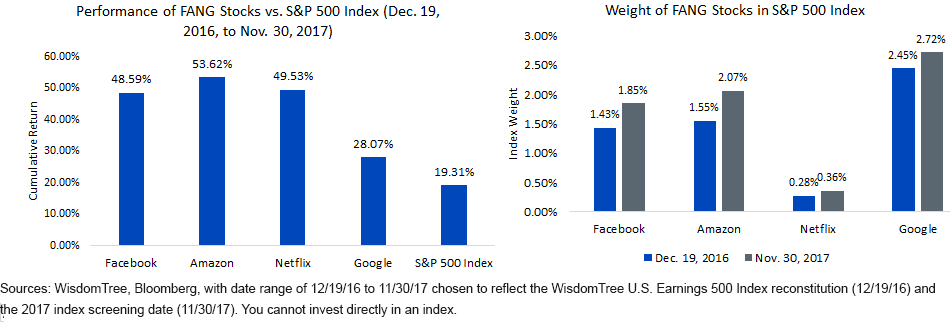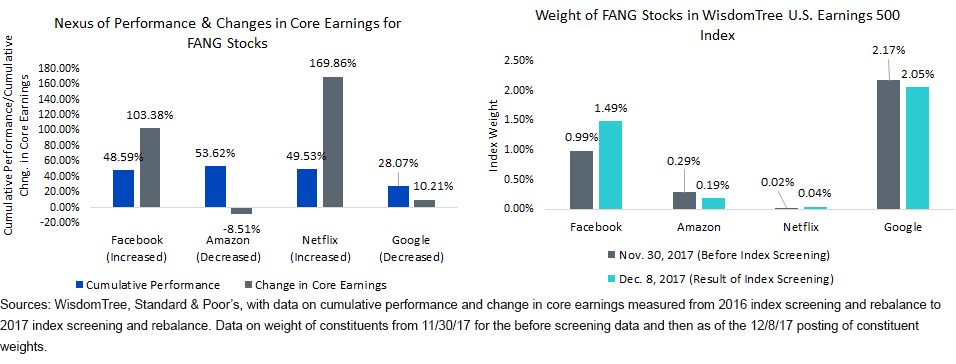What Happened to the FANG Stocks during WisdomTree’s Earnings Rebalance?


Almost every day, our society is barraged by information about at least one of the FANG (Facebook, Amazon, Netflix and Google) firms. Each one has the ability to influence the daily lives of millions—and possibly billions—of people. Not to mention, their equity performance was strong in a year when the S&P 500 Index reached record highs.
Potential Flaw of Market Capitalization-Weighted Indexes
It’s no secret that trillions of dollars are benchmarked to the S&P 500 Index—the most widely followed equity index in the world. In that Index, share price x number of shares outstanding = index weight. One of the reasons we’re hearing about the FANG stocks is their superior share price performance, and we can quantify how this has connected to increases in index weight.
Strong Performance => Increased S&P 500 Index Weight

Now, so long as these stocks continue their trends of outperformance, we can’t say this is a “bad” outcome. In fact, as momentum continued to drive the S&P 500 Index higher in 2017, holding greater and greater weights in these stocks has been positive. But many investors don’t believe the S&P 500 Index will simply continue up and up and up—they want to be ready for the correction they think is coming.
How WisdomTree’s Earnings Approach Differs from Market Capitalization Weighting
The FANG stocks—with their wide recognition—give us an opportunity to contrast what has happened using a market capitalization-weighted approach with what happens during an earnings-weighted rebalance. These stocks have been constituents in the WisdomTree U.S. Earnings 500 Index, which is where we now turn our focus.
Broadly speaking, the WisdomTree U.S. Earnings 500 Index methodology seeks to delink the level of the share price (and subsequently the size of the firm’s market capitalization) from the outcome of the index weighting decision. It does this by weighting each stock based on its core earnings. Over the course of a given year:
- Firms whose share prices appreciate and outperform the overall WisdomTree U.S. Earnings 500 Index will tend to grow in weight through that year until the annual rebalance, the data for which is screened each year on the last trading day of November. If the share prices of these firms have outperformed the growth of their core earnings, they will see their weights DECREASED.
- Firms whose share prices drop or underperform the overall WisdomTree U.S. Earnings 500 Index will tend to decline in weight through that year until the annual rebalance. If the share prices of these firms have underperformed the growth of their core earnings, they will see their weights INCREASED.
One could look at this as an inherent discipline that is driving the Index to “buy low and sell high.” From a factor perspective, there could be an inherent “anti-momentum” sensitivity being intuitively introduced, cutting the weight of top-performing companies unless they’ve grown their core earnings even more than their share prices have appreciated.
What Happened to the FANG Stocks in the WisdomTree U.S. Earnings 500 Index at the 2017 Rebalance?

- Tech Companies: Looking at the weights, we see that Facebook’s weight increased by approximately 50%, and it is becoming a very influential firm in the WisdomTree U.S. Earnings 500 Index with an exposure nearing 1.50%. Even though Google’s weight dropped, at 2.05% it remains the most influential company of the four because of its massive relative weight. While it might seem as though Information Technology should have seen its weight drop as part of this methodology, given that it was the top-performing sector, we find it interesting to point out that the weighted average growth in core earnings for the sector saw almost exactly the same performance as the WisdomTree U.S. Earnings 500 Index (about 35%). While Facebook’s weight grew and Google’s shrank, the aggregate sector weight of Tech firms stayed about the same.
- Discretionary Companies: Netflix saw its weight double, but it was only from 0.02% to 0.04%, so from a core earnings perspective it is relatively insignificant against these others. Amazon, the company that may at some point have a trillion-dollar market capitalization, saw its relative weight drop significantly on a core earnings basis, as its massive investment programs and spending are not helpful in increasing current core earnings. The Consumer Discretionary sector, unlike the Tech sector, saw a decline in weight of nearly 1.0%.
What’s the “Right” Exposure to the FANG Stocks?
While we aren’t aware of an index methodology that can tell us the “right” exposure to any stock today, we can say that the WisdomTree U.S. Earnings 500 Index has around half the exposure to these firms, at approximately 3.8%, as the S&P 500 Index, at approximately 7.0%. We’d simply caution people at this stage that, although these firms may continue to grind higher, owning more of what’s performed strongly is a strategy that hasn’t worked at all times in history, and it has never ceased to surprise people with the way in which it stops working.

Christopher Gannatti began at WisdomTree as a Research Analyst in December 2010, working directly with Jeremy Schwartz, CFA®, Director of Research. In January of 2014, he was promoted to Associate Director of Research where he was responsible to lead different groups of analysts and strategists within the broader Research team at WisdomTree. In February of 2018, Christopher was promoted to Head of Research, Europe, where he was based out of WisdomTree’s London office and was responsible for the full WisdomTree research effort within the European market, as well as supporting the UCITs platform globally. In November 2021, Christopher was promoted to Global Head of Research, now responsible for numerous communications on investment strategy globally, particularly in the thematic equity space. Christopher came to WisdomTree from Lord Abbett, where he worked for four and a half years as a Regional Consultant. He received his MBA in Quantitative Finance, Accounting, and Economics from NYU’s Stern School of Business in 2010, and he received his bachelor’s degree from Colgate University in Economics in 2006. Christopher is a holder of the Chartered Financial Analyst Designation.

